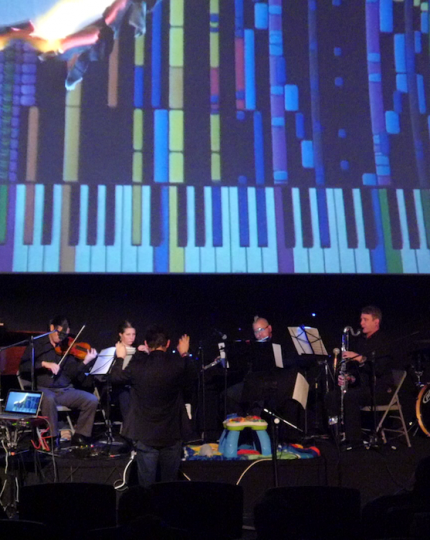Bracing ACM closer welcomes audience to the machine

In an era when we seem to give up vast chunks of our lives and privacy willingly to technology, it was a timely idea for Access Contemporary Music to base a program on machines.
ACM closed its season with a typically offbeat evening titled “Machine Language” Monday night at the Davis Theater in Lincoln Square. The stated inspiration for the concert was the machine, specifically offering “music inspired by machines, clocks, gears and mechanisms.”
As is inevitable on any new-music program, some pieces were more successful than others. But with executive director Seth Boustead providing his usual informal and engaging introductions and superb advocacy by the ACM musicians, the concert made a fine closer to their season.
Annie Gosfield has earned a following in New York for works that often draw from retro-technology elements. The title of Cranks and Cactus Needles refers to old wind-up phonographs, and the cactus spines once used as cheap needles. Scored for flute, violin, cello and piano, the music reflects its mechanical inspiration yet artfully avoids pastiche, in a way that is atmospheric without being literal. Gosfield’s musical effects suggest a hand-cranked start to an old Victrola and evoke a fragmented, unsentimental sonic nostalgia in the halting sounds, unpitched scrapes and off-center vibrato, the music slowly decaying like an errant phonograph winding down.
Nicole Lizée’s Sculptress is a multimedia work, combining filmed images with live performance for the full ensemble. The Canadian composer says Sculptress pays “homage to the beauty of outdated machines and their potential for dysfunction.” Lizée’s music at times suggests a certain unsettled stillness in its moments of hushed concentration. But the music tends to be upstaged by her succession of arresting images—including pictures of a reel-to-reel tape machine and piano keyboard being set afire, a hand smearing chocolate musical notes on a cake, and a broadcast from a miniature TV placed in a snowy tree branch.
Fittingly, it was the work that gave the program its title that made the strongest impression. Scored for unorthodox quartet (amplified violin, acoustic violin, cello and percussion) Dan Trueman’s Machine Language is inspired by genetic code and posits what the musical language of spontaneous mutations might sound like.
Despite its techno-nerd underpinnings, Machine Language was the most compelling work on the program (as well as the longest at nearly 20 minutes). The music leads off with a spare, broken-winged lyricism in the strings set again ominous percussion rumbling and tapping. The tempo accelerates and segues into a modal early-music counterpoint followed by a Baroque dance-like figure. More contrasting sections follow and while Machine Language is a bit episodic, Truman’s writing for the mixed quartet is so skillful that he consistently holds the listener’s attention.
Less essential was Elisha Denburg’s Fisher-Price Laugh and Learn Fun with Friends Musical Table. Though the integration of the live musicians with the title toddler’s educational toy was skillfully handled, the precious iterations of the Fisher-Price voices proved either cute or irritating, likely depending on whether or not one has children.
The evening opened with the world premiere of David Smooke’s The Mechanical Bird Museum. The composer’s interest in simulacra was clear as the busy, rustling avian-like sounds were performed by musicians spaced around the hall, the sonic perspective changing as the flutist and clarinetist slowly walked to the stage to join their seated colleagues.
All five works were given polished and committed advocacy by a septet of ACM regulars: violinists Jeff Yang and Arianne Urban (doubling on musical table), cellist Alyson Berger, clarinetist Cory Tiffin, flutist Trevor Patrick Watkin and pianist Amy Wurtz (doubling on toy piano). Young conductor Chris Ramaekers provided alert and well-balanced direction throughout.
ACM will present the Thirsty Ears Festival August 11-12 on Wilson Avenue between Ravenswood and Hermitage. acmusic.org
Posted in Uncategorized

